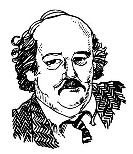(Syndicated to Kansas newspapers Nov. 24, 2014)
 What’s wrong with this sentence?: Voter turnout at spring elections for school boards and local government offices is too low, less than turnout at fall elections for state and national government offices, and that’s a problem the Legislature can fix.
What’s wrong with this sentence?: Voter turnout at spring elections for school boards and local government offices is too low, less than turnout at fall elections for state and national government offices, and that’s a problem the Legislature can fix.
The grammar is fine. What’s wrong with the sentence is that while grammatically good, it just doesn’t matter.
Legislators are looking hard at moving those spring elections where school board members, city councils, mayors and some other local officers are elected in fall elections in either the even-numbered years state and federal officials are elected or maybe the odd-numbered years when there are virtually no elections but voters could at least enjoy fall foliage when they drive to their voting places.
The issue that is being touted is that at those spring elections the voter turnout is low, half or less than the turnout at the August primary elections or November general elections.
And, that is described as a problem, or so Kansans are being told.
Now, it would be nice, of course, if every voter voted. But not every legal registered voter has to vote. It’s optional. Sure, we’ve all been brought up on the power of the vote, the responsibility of citizens to choose their leaders, but practically, some of those citizens just don’t care. And that, too, is their right.
Local candidates typically have less money to spend on campaigns than do state and national candidates. But, we’re thinking that if a city council candidate put out a flyer that he/she will have your street snowplowed first, or boosted the water pressure so you didn’t have to move the sprinkler as often, that might be a reason to vote in the spring. Or a school board candidate might propose that grade cards be simplified, just even letters, so your neighbor doesn’t brag about his kid’s C+ grade when yours brought home just a flat C. Might be a reason to make the drive to vote in the spring.
But, while voting is a right, it’s optional, and if people aren’t bright enough to figure that the level of government that has the most direct effect on their lives isn’t worth the time and work to vote, well, that’s their decision.
Interestingly, one part of a potential “fix” by the Legislature for this presumed problem is making those local elections, once they’re moved to a fall ballot, partisan. Yes, a Republican or Democratic mayor or city councilman or school board member.
Why partisan? Well, one likely reason is that if a school board member is elected as a member of a political party, rather than just someone interested in education, at some point, the party will “claim” responsibility for that candidate and presumably encourage the candidate to govern the schools in a way the party likes. More taxes, less taxes, teacher unions or discouraging teacher unions, shorter cheerleader skirts or whatever.
Suddenly, the school board member or council member or mayor is getting direction from the party. Good thing or not, that’s how things will move with making those elections partisan.
And, for those folks who don’t bother voting on local officials in the spring election, well, they’ve already parked the car and shown their photo ID, so they might as well go ahead and vote on every race on the ballot. That’s whether they know the candidates or have read about them or know or care about the local issues those local candidates campaign on.
Is there an upside to November elections and partisan local officials? That’s hard to tell. Local officials generally aren’t enthusiastic about it. Maybe that’s because they know their voters, or maybe because they just aren’t sure about putting the city council race at the bottom of a ballot with highly charged political races.
Or, maybe it’s because they think that the people who care enough about their local government to make a special trip in the spring to vote are the people they want deciding who makes the local government/school decisions.
If there’s no problem, what do you fix?
